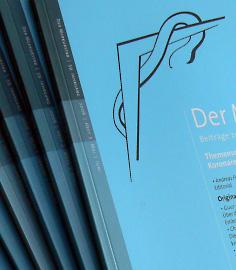
HEFT 6/2024
Der Merkurstab | November/Dezember 2024 | 18,00 Euro (inkl. Mwst., zzgl. Versandkosten)

| Artikel | Cancer stem cells and spatial tumor biology: reconceptualizing oncogenesis and cancer therapy |
| Autor | Juan Camilo Botero |
| Seiten | 382-387 |
| Volume | 77 |
Zusammenfassung
Totipotent embryonic cells drive embryogenesis
through a trinary model of cell division. Stem cells
have the following properties: self-renewal, differentiation
into a wide range of cell lines and selective
transition to apoptosis/quiescence. Stem cells can
transform into cancer stem cells (CSCs) when exposed
to environments with persistent unresolved
inflammation. Recent studies have discovered that
tumors consist of bulk tumor cells as well as subpopulations
of CSCs, which show resistance to radiation
and chemotherapy and result in tumor relapse
and persistence. Recent advances in technology
have enabled the study of tumors from the perspective
of its spatial organization, leading to the discovery of new molecular topo-biomarkers and toporegulators,
allowing sub-classification of the cell
with direct implications in tumor staging and treatment.
The highlight in the therapeutic approach
to CSCs is the results obtained with hyperthermia.
The weakness of CSCs is their sensitivity to hyperthermia
in a fever range of 39–42 °C. Furthermore,
hyperthermia destroys CSCs resistant to chemotherapy and radiotherapy. This paradigm opens
new avenues of research in using Viscum for cancer
treatment, specifically within the approach of anthroposophic
medicine.
